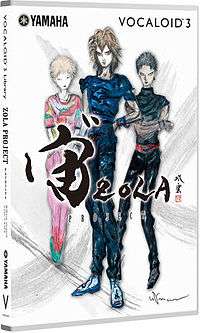ZOLA Project
|
Project Zola original package | |
| Developer(s) | Yamaha Coperation |
|---|---|
| Initial release | June 20, 2013 |
| Stable release |
Zola Project Neo
|
| Development status | Active |
| Operating system | Windows |
| Platform | PC, Mac |
| Available in | Japanese |
| Type | Vocal Synthesizer Application |
| License | Proprietary |
| Website | Homepage |
Zola Project is a release package for the Vocaloid 3 software containing the voices of 3 male singers. "ZOLA" is an acronym for "Zenithal Operated Liaison Aggregation".
Development
The project was first hinted at early in the month of February 2013, then officially announced in the following month of March that same year.[1]
More information was published in volume 10 of the magazine "VOCALOID wo Tanoshimou", which came out on March 11.[2] The singers were picked out of 40 voices, two being picked fairly quickly. Over 100 hours was spent recording them.[3]
ZOLA PROJECT was released on June 20, 2013, along with a special live-talk event on Nico Nico Douga.[4] In late April, a special event was held. The event was to present their final drawings and concepts, as well as voice samples.[5]
In May 2013, there was an interview on the YAMAHA Panel at niconico Chokaigi 2. Yuki Seto described three main features he believed ZOLA brings to VOCALOID:[3]
- The ability to create songs that haven't been possible until now.
- The highest quality audio due to thorough quality checking.
- Ease of use for beginners and experts alike.
To back up his first point, Seto mentioned that this was the first time a compound sound bank consisting of three male singers had been released, and consequently the sound bank supported trios, duets, backing harmony, and unison out of the box.
Regarding his second point on audio quality, Seto outlined the process for the creation of the sound bank. Previous sound banks were created by first deciding on a person, and then recording his or her voice. However, this was no guarantee that the person’s voice would be suitable for VOCALOID. Keeping this in mind, YAMAHA started with a total of forty candidates in their teens and twenties, and recorded temporary sound banks for all of them to test the sound quality before deciding on who the final three people would be. For these three, YAMAHA made them undergo over a half-year’s worth of "training" in practicing to read the "incantations" from which the phonemes could be extracted. Seto noted that this was because these incantations were very different from what would normally be on a dialogue script, but after training, the vocalists would be able to recite it all. The final stage of the process was that the staff at the YAMAHA Research and Development Center worked to put the data together into a sound bank.
For the final point, Seto highlighted several features of the product that he believed made it easy for both beginners and experts to use. First, it comes with a "Job Plugin" that makes it easier to make vocal data for groups of singers. Second, the sound bank is described as sounding good even without tuning, although further tuning improves it even further. Finally, the software package comes with a how-to booklet, as well as tutorial videos to assist people who are new to the software.
Prolific people of their fields have featured in ZOLA's creation, as well as famous illustrator Amano. The demo songs released in June were composed by Daisuke Asakura with lyrics by Yukinojo Mori.
Later also in 2013, a Mac version of ZOLA Project called "ZOLA Project NEO" was released.
Additional Software
Zola Project were also released for the Mobile Vocaloid Editor where the trio were sold separately.[6]
Characteristics
Yuki Seto confirmed that hiring Yoshitaka Amano (character designer for the Final Fantasy series), for "image illustrations," was part of an effort to expand the VOCALOID™ fanbase beyond the current segment of listeners. This was to create a new image for the software. Yuki Seto has stressed that Amano's artwork of the three vocalists are "image illustrations" and not "character designs." In other words, the artwork is like concept art, conveying a specific image instead of a specific character design. For the logo design, it is credited to Souun Takeda.[3]
Though Amano's designs remained the primary focus of advertisement and identity of the ZOLA product, additional designs were also produced with the intent of being additional, yet official, boxart designs. One of the reasons for this was to highlight different interpretations of the original Amano artwork, while giving YUU, KYO, and WIL, additional promotional art as well as alternative designs.[7]
Yuu
| Suggested Genre | Pop, Dance, Jazz |
| Suggested Tempo Range | 70 ~ 210BPM |
| Suggested Vocal Range | F2 ~ B3 |
Kyo
| Suggested Genre | Pop, Rock, Electro |
| Suggested Tempo Range | 70 ~ 210BPM |
| Suggested Vocal Range | B1 ~ E3 |
Wil
| Suggested Genre | Pop, R&B, Ballad |
| Suggested Tempo Range | 70 ~ 200BPM |
| Suggested Vocal Range | C2 ~ F3 |
See also
References
- ↑ ヤマハ株式会社. "VOCALOID™ / ボーカロイド 公式サイト : 新着情報・特集 : 製品情報 : 新ライブラリー「ZOLA PROJECT」サイトOPEN". VOCALOID™ / ボーカロイド 公式サイト. Retrieved 27 April 2016.
- ↑ "VOCALOIDをたのしもう Vol.10 (ヤマハムックシリーズ 135) : 本 : Amazon.co.jp". Retrieved 27 April 2016.
- 1 2 3 "Yamaha Panel at Niconico Chokaigi 2". Vocaloidism. Retrieved 27 April 2016.
- ↑ "男性3人組!? 新ボカロ「ZOLA PROJECT」発売記念トークショー生中継". ニコニコ生放送. Retrieved 27 April 2016.
- ↑ "初音ミクみく". Retrieved 27 April 2016.
- ↑ 株式会社インプレス. "iPad/iPhoneで本格ボカロ制作できる「Mobile VOCALOID Editor」。PC版とほぼ同等". AV Watch. Retrieved 27 April 2016.
- ↑ "VOCALOID3 Library ZOLA PROJECT". Retrieved 27 April 2016.
